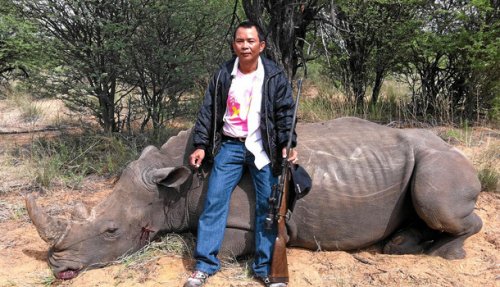Foreign Diplomats Urge Action On Wildlife Trafficking Syndicate
The US$1 million reward to dismantle the transnational wildlife trafficking syndicate, known as the Xaysavang Network, was underscored at a press conference of foreign diplomats held in Vientiane last Thursday.
The “linchpin”, Lao national Mr Vixay Keosavang, the director of Xaysavang Trading Export Import Company Limited, was recently seen in Laos.
US Ambassador to Laos Daniel Clune said Mr Vixay is still in Laos. “We offered the reward in November and we are in the process of gathering information that we received in response to that reward,” he added.
Attending the conference, German Ambassador to Laos Robert von Rimscha cited a major German news organisation, Der Spiegel, which claims it has access to Mr Vixay and that a middleman confirmed that he was recently in Pakxe.
Von Rimscha did not confirm the information, but the referred TV programme posted online last Sunday shows investigative journalist Karl Ammann meeting the wanted man inside his compound, boiling lion and tiger bones.
 Clune noted that the network is a transnational crime syndicate that facilitates wildlife trafficking and killing of endangered elephants, rhinos and other species, and utilises the profit from wildlife products to fund other illicit activities. The group’s associates, he added, smuggle wildlife from Africa and Asia into Laos and illegally export the products to Vietnam and China, among other destinations.
Clune noted that the network is a transnational crime syndicate that facilitates wildlife trafficking and killing of endangered elephants, rhinos and other species, and utilises the profit from wildlife products to fund other illicit activities. The group’s associates, he added, smuggle wildlife from Africa and Asia into Laos and illegally export the products to Vietnam and China, among other destinations.
The US is reportedly the second-largest retail market of illegal ivory trade after China.
“The Xaysavang reward offer is intended to produce information that will help the government in Laos and other governments to take action in dismantling the network. And we welcome the cooperation of other governments to counter transnational organised crime including wildlife trade,” he said.
T he foreign diplomats are optimistic that Laos will take serious action in the fight to end wildlife crime. They mentioned that Laos was one of 42 countries and 11 international organisations that participated in the London Conference on the Illegal Wildlife Trade in February.
All countries, including Laos, have been exposed to this crime that has become “more and more violent, profitable and corrupt”, United Nations Office on Drugs and Crime Programme Officer Giovanni Broussard said at the press conference.
He said countries should start switching the focus of intervention from the mere management of resources to the increase of criminal justice responses.
“We need to defeat these criminal networks,” Broussard said. Setting environmental crime, such as wildlife trafficking and the illegal timber trade, as a priority for national security among countries is a positive sign, he added.
He said Myanmar has special a police force dedicated to the task, while Vietnam issued a new prime ministerial decree to give added responsibilities in the fight against environmental crime.
Pertaining to villagers who are hunting wildlife for food, European Union Charge d’Affaires Michel Goffin said they respect Lao people’s consumption of wildlife but it has to be managed.
British Ambassador to Laos Philip Malone said there is a very big difference between wildlife hunters and large trafficking organisations. He said the real problem lies in “transnational organised crimes that have nothing to do with villagers hunting for food in the forest.”
The press conference also marked the first ever World Wildlife Day on March 3.
Source: Vientiane Times

